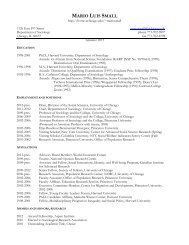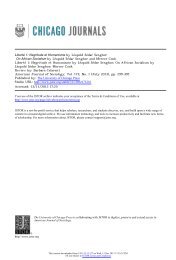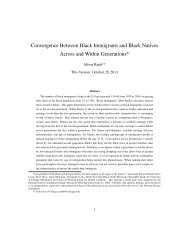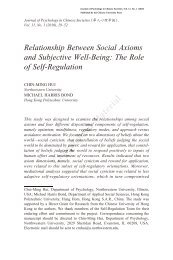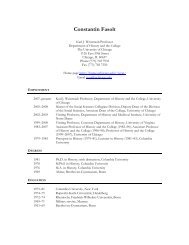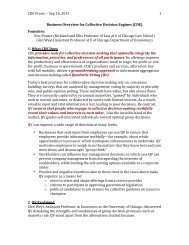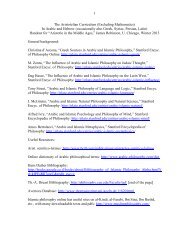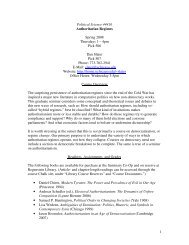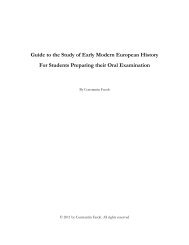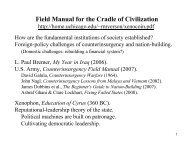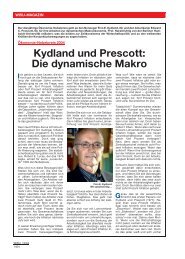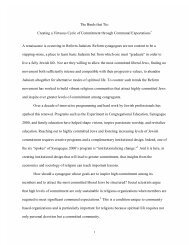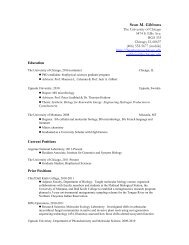Job Market Paper - Personal Web Pages - University of Chicago
Job Market Paper - Personal Web Pages - University of Chicago
Job Market Paper - Personal Web Pages - University of Chicago
You also want an ePaper? Increase the reach of your titles
YUMPU automatically turns print PDFs into web optimized ePapers that Google loves.
Kim: Endogenous Choice <strong>of</strong> a Mediator<br />
1 Introduction<br />
Two parties with private information <strong>of</strong>ten employ mediators as one <strong>of</strong> the primary tools <strong>of</strong> dispute<br />
resolution.<br />
However, in many economic, political, and social situations, two parties <strong>of</strong>ten fail<br />
to reach a consensus in their selection <strong>of</strong> a mediator that resolves conflict peacefully.<br />
Despite<br />
the significant amount <strong>of</strong> theoretical work on mediation, the theory <strong>of</strong> how privately informed<br />
parties choose mediators is not well developed. My interest is in understanding the endogenous<br />
selection <strong>of</strong> mediation. Through this paper, I attempt to build a theory <strong>of</strong> how parties with private<br />
information might agree on a mediator and provide a richer understanding <strong>of</strong> the failure <strong>of</strong> efficiency<br />
in mediation.<br />
I consider a simple bargaining problem in which two players with private information about<br />
their own types – strong or weak – can each choose war or peace. There are also mediators that the<br />
players can negotiate over which to choose. In this paper, the definition <strong>of</strong> a mediator is a person<br />
who is not informed about the players’ types but who is trying to negotiate settlement between the<br />
players while respecting their private information. This setup allows us to consider a mediator to<br />
be equivalent to a communication-settlement device, or a mechanism. 1 Therefore, by the revelation<br />
principle, I take the space <strong>of</strong> mediators that are available to the players to be synonymous with the<br />
space <strong>of</strong> incentive compatible and individually rational 2 mechanisms the players can agree on.<br />
Which mediator should the players choose? One might be tempted to think that the players<br />
would bargain for an ex ante Pareto dominant solution. That is, the players could possibly select<br />
the mediator that is incentive efficient given the other’s type and that maximizes the ex ante pay<strong>of</strong>fs<br />
<strong>of</strong> all the players. Indeed, in my setting, there is a unique ex ante incentive efficient mediator that<br />
both players might find it focal to choose.<br />
However, this naive idea that the ex ante incentive<br />
efficient mediator would be chosen is problematic. In particular, if players already know their types<br />
at the time they bargain over choosing a mediator, the problem <strong>of</strong> “information leakage” arises: the<br />
fact that a player expresses his preference for a particular mediator conveys information about his<br />
type. For this reason, the issue <strong>of</strong> which mediator would get selected is far from trivial.<br />
My main insight is that the selection <strong>of</strong> the mediator is endogenous, and the selection reflects<br />
this informational concern.<br />
Not surprisingly, it is not at all obvious that the players amongst<br />
1 A mediator is “a person or machine that can help the players communicate and share information” (Myerson,<br />
1991, 250).<br />
2 No player could gain by being the only one to lie to the mediator about his type or to not participate in the<br />
mediation.<br />
2



